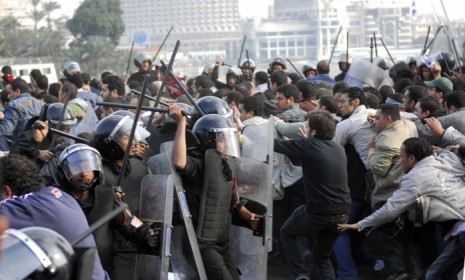Egypt: The next Tunisia?
Inspired by their North African neighbors, Egyptians are marching against the government of President Hosni Mubarak. Will they start a revolution?

A free daily email with the biggest news stories of the day – and the best features from TheWeek.com
You are now subscribed
Your newsletter sign-up was successful
The video: On Tuesday, in "an unprecedented display of anti-government rage," tens of thousands of Egyptians took to the streets of Cairo and other cities to call for the overthrow of the country's longtime president, Hosni Mubarak. (See video below.) Egypt's security forces were initially overwhelmed by the number of protesters, but by Wednesday, they were striking back with more decisive force, unleashing concussion grenades and tear gas on groups of protesters. Four people have been killed in rioting thus far, and the government has banned access to Twitter and possibly Facebook. But will the authoritarian crackdown prevent full-fledged rebellion?
The reaction: When you factor in Egypt's "rising unemployment," "rampant corruption," and "political repression," plus the power of social networks, "it's hard to see how all this won't continue to rumble," says Matt Frei at BBC News. Even if this week's protests die down, they're likely to spring up again soon, and with so many "moving parts" involved in the story, "2011 could still become the Middle East's 1989." And Jody McIntyre at The Independent says that "Mubarak and his gang reacted by trying to keep the news suppressed," but "the plan failed," and the protests will likely continue. The Egyptian dictator has also declared a state of emergency, a tactic he's frequently employed to suppress his rivals. But "Mr. Mubarak, not even that will save you now." Watch a clip of the protests:
A free daily email with the biggest news stories of the day – and the best features from TheWeek.com
The Week
Escape your echo chamber. Get the facts behind the news, plus analysis from multiple perspectives.

Sign up for The Week's Free Newsletters
From our morning news briefing to a weekly Good News Newsletter, get the best of The Week delivered directly to your inbox.
From our morning news briefing to a weekly Good News Newsletter, get the best of The Week delivered directly to your inbox.